- Home
- Lisa Smedman
Tails You Lose Page 2
Tails You Lose Read online
Page 2
For Alma, the rise to the top of PCI's counterextractions department had been a smooth one, but for Gray Squirrel, his success in the research and development division was a mixed blessing. More than once, he had confided to Alma the problems he was having at home. His wife just didn't understand the importance of his lengthy business trips to the PCI labs in the Philippines and was irritated by his round-the-clock research. He'd already compromised by always knocking off promptly at 11 p.m., no matter how engrossing the research was, and coming straight home, but still she complained.
Alma had reassured Gray Squirrel that a corporation was also a family—one that made equally valid demands on his time. And it was a family he could count on. Relationships had only two people to keep them going, and they often failed, but a corporation was sustained by hundreds or even thousands of employees. If one faltered, the others would be there to ensure its survival.
Unless, of course, the corporate family was deliberately torn apart by the UCAS judicial system and scattered to the winds—as her first one had been.
Gray Squirrel was one of the top researchers in Pacific Cybernetics' R&D lab. He was the driving force behind the REM inducer, one of PCI's most cutting-edge projects, which was certain to push the Vancouver-based company into the corporate big leagues once it was released. For that reason, Alma had been keeping an eye on him. She'd been prepared for an extraction attempt once the project's beta-testing was complete and the REM inducer was officially announced.
She hadn't expected it to come so soon. The suddenness of Gray Squirrel's extraction—and its meticulous execution—had taken her completely by surprise. Even the I Ching had not warned of it.
Perhaps today's message would become clearer as the day progressed. The first line of the hexagram had been changing yang; the second two were both changing yin. At some point in the next twenty-four hours the situation would change as yang became yin and yin became yang. A different hexagram would emerge: Meeting.
Alma hoped that this change would be for the better—that the "meeting" referred to would be the result of her successful recovery of Gray Squirrel. But as always, the I Ching was silent on the specifics. The coins could provide guidance, but it was Alma's own actions that would ultimately determine how the day would unfold.
* * *
Alma stood in front of the Heroes' Totems on Georgia Street, waiting under an umbrella for Reynolds to pick her up. From a distance, the nine totem poles appeared to be smooth cylinders of polished steel. The only features that could be made out were the regimental totems that perched at the top of each pole: wolf, bear, eagle, deer, thunderbird, killer whale, salmon, frog and beaver, all cast to resemble traditional Northwest Coast carvings. It wasn't until you got closer that the names inscribed on the poles could be seen. And it wasn't until you touched the names themselves that the digipics of the Rangers who had died were revealed.
Alma pressed a finger against one of the names on the killer whale pole and watched as the face of a young elf shimmered into view on the shiny surface like a face suddenly reflected by a mirror. Peter Charlie was a handsome man with reddish-blond hair and freckles that seemed to make a lie of his strong Native cheeks and nose. He had a cocky, confident smile that contrasted with the raindrops trickling down the surface of the pole, making it look as if tears were streaming down his cheeks. Alma felt tears begin to well in her own eyes and angrily blinked them away.
Peter had only worked seventeen months at PCI before quitting his job as a security guard to fight in the Tsimshian Border War, but they had developed a close friendship over that short time. He shared Alma's love of demanding sport, and with his whiplike reflexes and wiry muscles he was one of the few people who could keep up with her in a one-on-one game of lacrosse toss. Had Alma not been his superior at PCI, they might have become lovers. They'd come close to it, on that night before his regiment was sent north. During the two months he was on active duty they'd kept in touch via telecom; the first thing Peter had done whenever he came in from a patrol was call her.
The telecom calls had stopped abruptly in May, during the major offensive that ended the Border War. In the days that followed the battle, the newsfaxes reported the horrendous details: the Tsimshian forces, harnessing the powerful ley lines that Hailey's Comet had activated, unleashed new and terrible magics upon the Salish-Shidhe forces. Most of the Rangers were killed outright by the incredibly augmented stunballs the Tsimshians hit them with—their basic motor functions shutting down as the synaptic connections in their brains were torn to shreds. Others lived but suffered severe brain damage that neither the medical mages nor the cybersurgeons could repair.
Peter was one of the unlucky ones who wasn't killed outright. The lingering effects of the stunball produced an overstimulation of a part of his brain called the reticular formation. It destroyed his ability to sleep. By the time he was med-evacuated down to Vancouver, he'd been awake for nine days. Alma had been shocked by his deterioration. Hollow-eyed, trembling, unable to feed himself or form a complete sentence, he'd lingered for two days more. Alma had held his hand and told him she loved him, and she thought she heard him slur the same words back at her but couldn't be sure. Then he died.
The badly mauled Salish-Shidhe Council had drafted a peace accord with Tsimshian in the week following the battle that came to be known as the Mind Grind. That peace had been strained to the breaking point over the past nine months, as Tsimshian forces and Ranger patrols continued to clash along the border. Many of the skirmishes ended with yet another use of the deadly stunballs, putting more brain-damaged soldiers into Salish-Shidhe critical-care wards.
Alma lifted her finger from the Heroes' Totem and watched as Peter's face faded from view. His death was what had prompted her to volunteer to have a beta-test version of the REM inducer implanted in her brain. The very day that she'd been briefed on Gray Squirrel's project, she'd insisted on becoming one of the test subjects. The testing could be brought home to PCI's Vancouver laboratories, speeding up the project. The sooner a fully tested REM inducer was ready, the fewer soldiers had to die.
In the wake of Gray Squirrel's extraction, that testing had come to a complete halt. Alma glanced up Burrard Street toward St. Paul's Hospital, with its veterans' wing. The lives of the soldiers who lay wide awake in their beds, unable to sleep despite heavy doses of magic and medication, were in the hands of one Pacific Cybernetics researcher: Gray Squirrel. It was up to Alma to bring him home.
* * *
Alma activated her binocular vision and peered out through the rain-smeared windshield of the panel van. They'd parked on the uppermost level of a parking facility that afforded an excellent view of the cargo terminal—the perfect spot to set up an observation post.
On the waterfront below, containers were stacked in long rows, one on top of the other, like gigantic building blocks. Enormous automated cranes that ran the length of the pier lifted the metal containers one by one and deposited them into the holds of waiting container ships. The low whine of heavy machinery and the distant clank of steel container on steel deck drifted in through the driver's window, which Alma had cracked open in an effort to clear the smoke from the incense Reynolds had just burned. It was cloying against the heavy smell of the oil-collection containers in the back of the van.
Alma watched for signs that the port's security force had noticed the shaman's astral incursion. Nothing looked out of the ordinary, however. A Port of Vancouver patrol vehicle cruised slowly past the Plum Blossom's berth but did not turn onto the pier itself. So far, so good.
Alma switched her binocular vision off and glanced over at the elf who sat in the passenger seat beside her. When he was conscious, Reynolds was a constant flutter of nervous energy, but now he slumped looseboned in the worn bucket seat. His body was completely motionless except for his eyes, which roved back and forth under closed lids like those of a dreaming man. He wore his prematurely gray hair Native-style, in two long braids that draped across the shoulders of hi
s Mohawk Oil coveralls. A pigeon feather was tied into the end of each braid. Both feathers suddenly fluttered, as if in an unseen breeze. A moment later, Reynolds jerked awake as his astral body and physical body merged.
"Any results?" she asked.
The shaman bobbed his head several times in the pigeonlike nod he always used. "I think I've found him. I did a quick flythrough of every container on that pier and didn't find any astral signatures. There's only one container that could possibly have anything living inside it—and it's warded against astral intrusion. I couldn't get in."
"Which one is it?" Alma asked.
"One of the yellow ones." He pointed a slender finger. "It's second from the bottom in the row under the blue crane—five back from the end of the row where the crane's working now. There's a green container above it and a red one below. Can you see it?" Alma increased the wipers' speed and sighted along Reynolds' forefinger. When she found it, she used her binocular vision to note the blue crane's number—C21—and to get a closer look at the container itself. She saw what she expected: "Swift Wind Cargo" stenciled on the side in red Chinese characters. The container had four others stacked above it, and its ends were wedged tight against containers to either side of it in the row.
"What side is the door on?" she asked.
Reynolds pointed with a bob of his head. "West side."
She backed off her cybereyes' magnification and used her eye's camera function to snap a digital image of the terminal, marking the position of the target container with a red crosshair. Given the crane's speed—it took an average of three point five minutes to lift and load each container onto the ship—they had approximately one hour and forty-eight minutes before their target would be lifted onto the Plum Blossom. The Swift Wind container was in the second-best possible position: only one level up from the ground. Clearing the door meant lifting five containers out of the stack—with luck, the Plum Blossom's crew wouldn't notice that those five containers were being loaded out of sequence. Once they were out of the way—a process that should take approximately seventeen minutes and thirty seconds—Alma could open the door and haul the stabilization unit out onto the top of the adjoining container in the bottom row. From there, it was a three-meter drop to the ground—a distance that Reynolds could easily handle with a levitation spell.
The only worry was the magical ward. Whoever had extracted Gray Squirrel didn't want him to be found. The ward made her wonder if any other protective measures had been put in place.
She activated the microphone that was implanted under her skin and spoke to the team's technical support member. "Rover to Base."
A female voice whispered softly from the subdermal speaker located behind Alma's left ear. "Base here." The transmissions were encrypted, but even so, her teams were trained never to use personal identifiers on air. Riva Schell was one of PCI's best Matrix-intrusion experts. Alma had hand-picked her for this job.
"Observer has located our target. It's located under unit Charlie Two One, position two from ground, five units back from area where Charlie Two One is currently engaged. Primary color 'yukon,' secondary color 'romeo.' Access is on west side and will require five relocations. Please confirm instructions, over."
There was a moment's pause. Alma waited patiently, knowing that Schell would be accessing the automated crane's monitor cameras and visual-positioning systems.
"I see it," Schell said.
Alma instructed Schell to stand by. She did a quick radio check with Reynolds, who was wired with the standard ear speaker and mini-mike favored by delivery drivers, and then cracked the door of the van.
A gust of cold wind blew in through the partially open door, and in that same moment thunder grumbled overhead. The rain suddenly intensified, drumming on the roof of the van and covering the windows in a torrent of water.
Reynolds leaned forward in his seat and cocked his head to the side to look up at the sky with a baleful eye. "Storm crows," he said, twisting his head around to peer at them with his other eye. "We're in for another bad storm."
Alma eased the door shut and glanced out the windshield herself. Just above the parking garage, dozens of large black birds were winging their way east, racing ahead of the wind. They looked like ordinary crows to Alma.
"How do you know they're storm crows?"
"Their aura. It's dark gray with streaks of white, like lightning against a storm cloud."
"Are they going to affect your ability to cast magic?" Reynolds shook his head but kept a cautious eye on the crows. "No. I just don't like them. Crows are bad luck."
The flock wheeled out over the harbor in a ragged formation reminiscent of a lightning bolt. As the stragglers winged their way after the rest, the pounding rain lessened. Alma cracked the door a second time. "Reynolds!"
The shaman tore his eyes away from the sky.
Alma made a quick calculation of distances and speeds. "It should take me eight minutes to reach our target once I'm inside the gate. If you start moving at the six-minute mark, we should both arrive at the target at approximately the same time."
"Don't worry, " Reynolds said, pulling up his sleeve to display an oversized, manual-wind wristwatch. "I'll be on time."
Inwardly, Alma ground her teeth at the archaic tech. The watch was more than a century old, and she could hear that its ticking was arrhythmic. Why did shamans insist on using such obsolete equipment? Reynolds was one of the best magically active sec-guards PCI had, but if magic was going to get them out, it was technology that was going to make the job possible in the first place.
* * *
Alma stood at the side of the road, pretending to use the public telecom. The filters in her cyberears allowed her to screen out the sound of rain pattering against the yellow plastic slicker she wore—the standard, if unofficial, wet-weather gear of longshore workers on the docks. The telecom booth lay just on the other side of the overpass that led to the sprawling Vanterm cargo port. To the casual observer, she'd look like she belonged here.
She heard a large truck approaching, and the distinctive metal clatter of the container on its flatbed. With her back to the road, she listened for the sound of air brakes, and for the change in the swish of tires on wet cement that meant the truck was slowing down. At the precise moment that she knew the cab of the truck would be turning onto the overpass, causing the driver to lose sight of the back of the vehicle in his side-mounted mirrors, Alma shed her rain slicker, turned and sprinted. She hit the pavement and rolled, reaching up for the underbelly of the flatbed. Fingers and thumbs viced onto a lip of metal and locked, and in the same motion she bucked her body up, bracing her feet against another ridge. The rubber soles of the rock climber's boots she wore gripped and held. Alma pushed, making her body as rigid as the metal to which she clung.
As the truck rumbled across the overpass, the container on its flatbed rattling with each bump, Alma held on tight. The smells of oil and exhaust filled her nose. Her move-by-wire system allowed her to compensate for each bump and lurch of the truck, preventing her face from striking the underside of the flatbed. Her left hand trembled, and its grip loosened for thirty-six agonizing seconds, but the fluorinated polymer that had been braided into the vat-grown muscle tissue throughout her body gave her fingers the strength of vice grips, easily allowing her to hang on with just her right hand. Using her subdermal microphone, she instructed Schell to begin clearing a path to their target.
The truck descended the far side of the overpass, rounded a bend, and came to a stop outside a gate. She filtered out the engine's grumble so she could hear the truck driver checking in with the guard at the gate, who gave the driver directions to the spot where the container would be offloaded.
Rain was still pelting down all around the truck, making it unlikely that the secguard would do a visual inspection. Even if he did, he was unlikely to spot Alma. The insulated bodysuit, boots and fingerless gloves she wore were all a dull brown, mottled to match the mud-splattered underside of the truck. So wa
s the tool bag that was velcroed to her chest.
Alma heard the clunk of gears being shifted. The truck lurched forward again and rolled inside the razorwire-topped chainlink fence that surrounded the terminal.
"Rover here," she subvocalized into the microphone at her throat. "I'm in."
When the truck slowed to make a turn, Alma released her fingers and feet. The ground was approximately a meter below, and she timed her muscle relaxation accordingly. When she hit the ground she was as loose-limbed as a drunk and took no damage from landing on the cement. A moment later, her move-by-wire system snapped her muscles to attention, allowing her to roll out from under the truck before its rear wheels could flatten her.
As the truck disappeared behind a wall of containers, Alma crouched in the wall's shadow and uploaded the digital image she'd shot from the parking arcade earlier. She oriented herself in relation to the crosshaired container and calculated her ETA. Then she activated her retinal clock and set its timer.
"Rover to Base. Can you see me?"
"Base here," Schell answered immediately. "That's an affirmative. You're already behind smoke."
"I'm approximately eight minutes away from our target. How's the clearing going?"
"I'm two units away from our target."
Perfect. The final two containers would take approximately seven minutes to clear. Everything was going like clockwork—just the way Alma expected it to. "Good work. Prepare to start extending the smoke."
"Will do."
Reconfiguring the programming of Crane 21 so that it loaded five containers from the middle of the stack had been relatively easy for the team's Matrix specialist, but now the tricky part was about to begin. To cover Alma's movements across the terminal, Schell had to access dozens of security cameras at once and then create a one-second delay in the data that was streaming back from them. That gave her one second in which to feed an "instant replay" loop into each of the securicams just as Alma moved into its field of view. The net effect would be to render Alma invisible—all the cameras would "see" was a blank wall of containers.

 Extinction
Extinction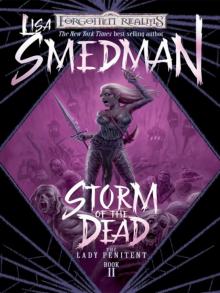 Storm of the Dead
Storm of the Dead Blood Sport
Blood Sport The Lucifer desk (s-2)
The Lucifer desk (s-2) Vanity's Brood
Vanity's Brood Sacrifice of the Widow
Sacrifice of the Widow Vanity's brood hos-3
Vanity's brood hos-3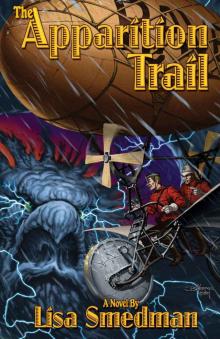 Apparition Trail, The
Apparition Trail, The Venom's Taste
Venom's Taste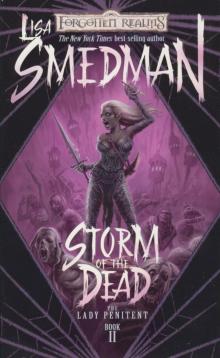 Forgotten Realms - The Lady Penitent - Storm of the Dead
Forgotten Realms - The Lady Penitent - Storm of the Dead Viper's kiss hos-2
Viper's kiss hos-2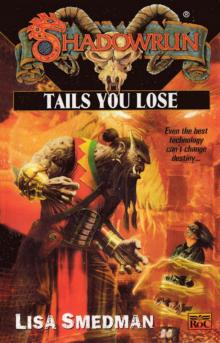 Tails You Lose
Tails You Lose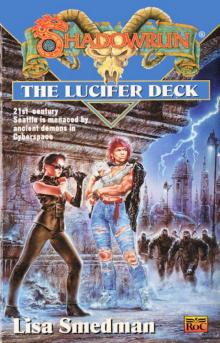 The Lucifer Deck
The Lucifer Deck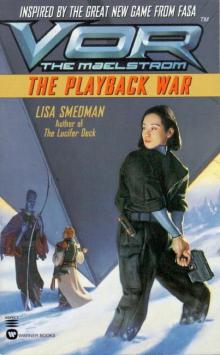 Vor: The Playback War
Vor: The Playback War Forgotten Realms - House of Serpents 1 - Venom's Taste
Forgotten Realms - House of Serpents 1 - Venom's Taste Storm of the Dead зкp-2
Storm of the Dead зкp-2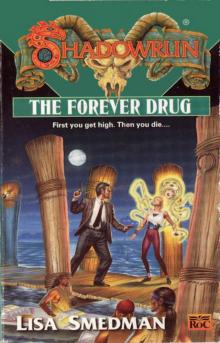 The Forever Drug
The Forever Drug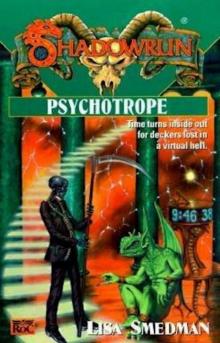 Psychotrope
Psychotrope Realms of Shadow a-8
Realms of Shadow a-8 Venom’s Taste hos-1
Venom’s Taste hos-1 Psychotrope s-33
Psychotrope s-33 Ascendency of the Last
Ascendency of the Last Heirs of Prophecy
Heirs of Prophecy Ascendancy of the Last зкp-3
Ascendancy of the Last зкp-3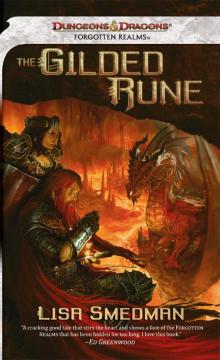 The Gilded Rune (forgotten realms)
The Gilded Rune (forgotten realms) Sacrifice of the Widow: Lady Penitent, Book I
Sacrifice of the Widow: Lady Penitent, Book I The Lucifer desk s-23
The Lucifer desk s-23 Sacrifice of the Widow lp-1
Sacrifice of the Widow lp-1 Viper's Kiss
Viper's Kiss Forgotten Realms - The Lady Penitent - Ascendancy of the Last
Forgotten Realms - The Lady Penitent - Ascendancy of the Last